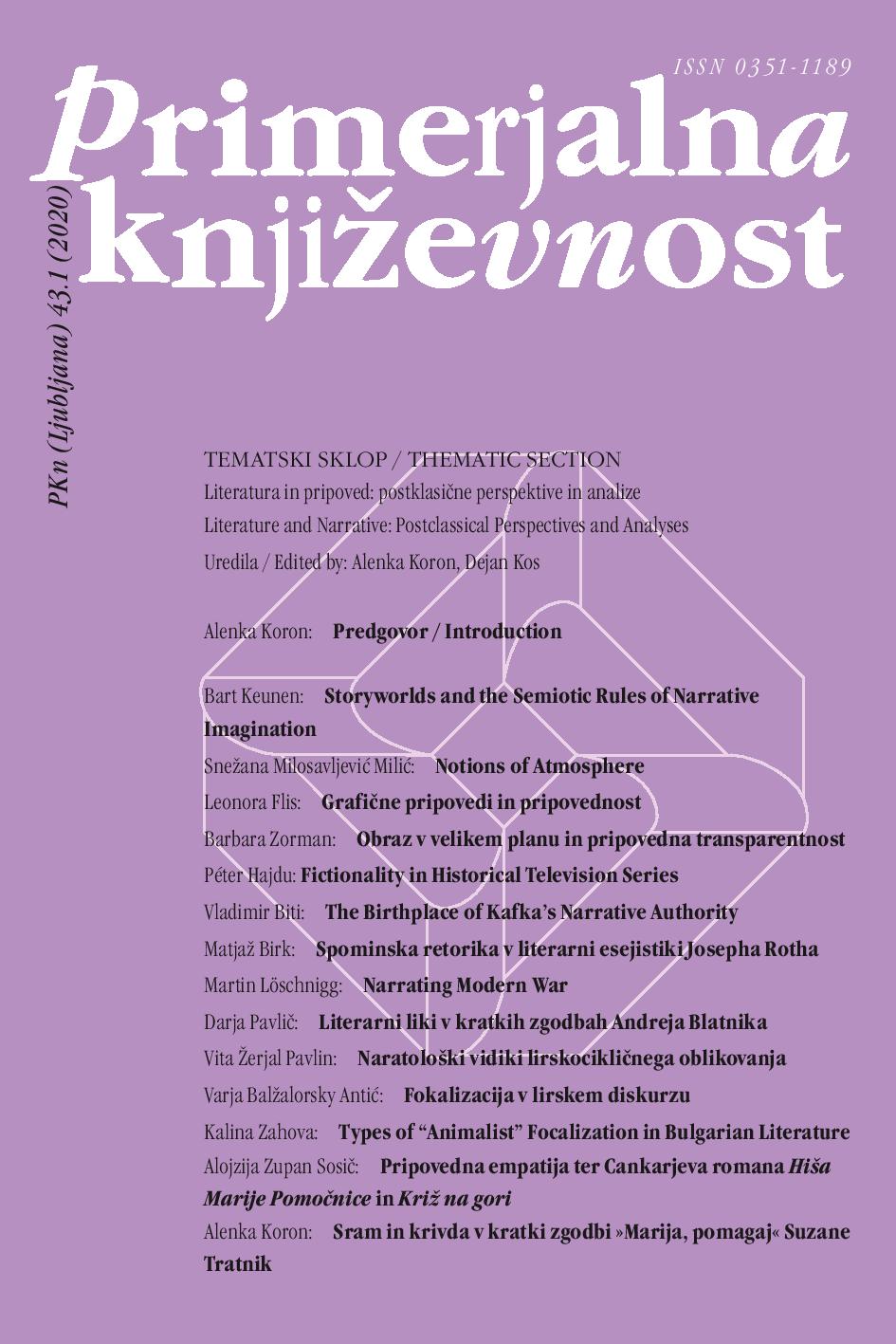Literary Characters in Andrej Blatnik’s Short Stories
DOI:
https://doi.org/10.3986/pkn.v43.i1.09Keywords:
cognitive narratology, Fludernik, Monika, Slovenian literature, short story, Blatnik, Andrej, literary characters, narrative structure, experientiality, consciousnessAbstract
Andrej Blatnik’s short stories are based not on the actions of literary characters, but on their consciousness, which is foregrounded. Therefore, appropriate tools for their analysis are concepts that have evolved within the framework of cognitive narratology. In the article, I specifically highlight the notion of experientiality introduced by Monika Fludernik to explain narrativity. Due to its complexity, I seek to explain the concept by pointing to its connection with readers, literary characters, and storytellers. At the level of literary characters, experientiality can be equated with their consciousness, especially when consciousness is understood in relation to the body or as an embodied mind. Blatnik’s literary characters respond emotionally and physically to events, reflect on their never-realized plans, and often ponder how others see them. As a rule, they are unsuccessful in reading the minds of other characters, which I show by analyzing three selected short stories: the postmodernist “Story about Rošlin and Verjanko,” the minimalist “Wet Walls,” and the modernist “Out of Passion.”
References
Blatnik, Andrej. Biografije brezimenih. Ljubljana: Aleph, 1989.
Blatnik, Andrej. Ugrizi. Ljubljana: LUD Literatura, 2018.
Blatnik, Andrej. »Zgodba o Rošlinu in Verjanku«. Rošlin in Verjanko. Ur. Vlado Žabot. Ljubljana: Književna mladina Slovenije, 1987.
Caracciolo, Marco. »Fictional Consciousness: A Reader’s Manual«. Style 46.1 (2012): 42–65.
Fludernik, Monika. »Natural Narratology and Cognitive Parameters«. Narrative Theory and the Cognitive Sciences. Ur. David Herman. Stanford: CSLI Publications, 2003.
Fludernik, Monika. »Response Essay: Towards a ‘Natural’ Narratology Twenty Years After«. Partial Answers 16.2 (2018): 329–347.
Fludernik, Monika. Towards a ‘Natural’ Narratology. London in New York: Routledge, 1996.
Jannidis, Fotis. »Character«. The Living Handbook of Narratology. Ur. Peter Hühn idr. Hamburg: Hamburg University. Splet. 17. januar 2019.
Palmer, Alan. »Attribution Theory: Action and Emotion in Dickens and Pynchon«. Contemporary Stylistics. Ur. Marina Lambrou in Peter Stockwell. London: Continuum, 2010.
Palmer, Alan. Fictional Minds. Lincoln in London: University of Nebraska Press, 2004.
Prince, Gerald. A Dictionary of Narratology. Aldershot: Scolar Press, 1988.
Prince, Gerald. »Narrativehood, Narrativeness, Narrativity, Narratability«. Theorizing Narrativity. Ur. José Angel García Landa in John Pier. Berlin: Walter de Gruyter, 2008.
Rimmon-Kennan, Shlomith. Narrative Fiction. London in New York: Routledge, 2002.
Robbe-Grillet, Alain. Pour un nouveau roman. Pariz: Minuit. 1963.
Schneider, Ralf. »Toward a Cognitive Theory of Literary Character: The Dynamics of Mental-Model Construction«. Style 35.4 (2001): 607–640.
Zupan Sosič, Alojzija. Teorija pripovedi. Maribor: Litera, 2017.


